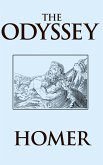In "The Fall of Troy," Quintus Smyrnaeus masterfully recounts the catastrophic events surrounding the Trojan War's conclusion, offering a vivid narrative steeped in the epic tradition of ancient Greek literature. Written in hexameter verse, the poem serves as both a continuation of Homer's Iliad and a poignant retelling that captures the poignant emotions of loss and despair faced by both victors and vanquished. The rich, descriptive language and intricate characterizations invite readers into the tumultuous world of gods and mortals, while also reflecting the socio-political milieu of the 4th century, where the themes of heroism and fate resonate deeply within the fabric of Greek identity. Quintus Smyrnaeus, believed to have lived in the 4th century AD, immersed himself in the classical literary tradition, drawing inspiration from earlier epics. His work embodies the transitional phase of Greek literature, melding the heroic spirit of antiquity with contemporary perspectives. The intricate storytelling and emphasis on emotional depth indicate an author wrestling with the implications of war and its aftermath, perhaps influenced by the ongoing conflicts of his time. For enthusiasts of classical literature and those seeking a profound understanding of mythological narratives, "The Fall of Troy" is an essential read. This work not only stands as a testament to Smyrnaeus's literary prowess but also invites reflection on timeless themes of conflict, tragedy, and the indelible scars they leave on human civilization.
Dieser Download kann aus rechtlichen Gründen nur mit Rechnungsadresse in A, B, BG, CY, CZ, D, DK, EW, E, FIN, F, GR, H, IRL, I, LT, L, LR, M, NL, PL, P, R, S, SLO, SK ausgeliefert werden.









